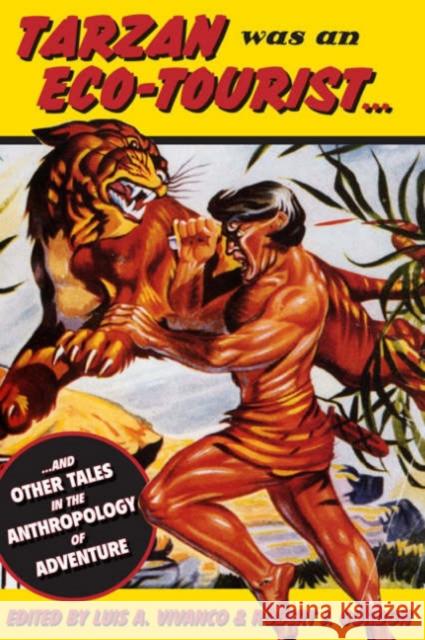Tarzan Was an Eco-tourist: ...and Other Tales in the Anthropology of Adventure » książka
Tarzan Was an Eco-tourist: ...and Other Tales in the Anthropology of Adventure
ISBN-13: 9781845451110 / Angielski / Miękka / 2006 / 340 str.
Tarzan Was an Eco-tourist: ...and Other Tales in the Anthropology of Adventure
ISBN-13: 9781845451110 / Angielski / Miękka / 2006 / 340 str.
(netto: 129,05 VAT: 5%)
Najniższa cena z 30 dni: 134,94
ok. 30 dni roboczych
Bez gwarancji dostawy przed świętami
Darmowa dostawa!
"An important strength of this collection is the ethnographic grounding of the chapters, which directly engage rich ethnographic understandings with Simmel's work. This book is a useful addition to the anthropological literature on travel and tourism, and it is a pleasurable adventure to read." - American Anthropologist Adventure is currently enjoying enormous interest in public culture. The image of Tarzan provides a rewarding lens through which to explore this phenomenon. In their day, Edgar Rice Burrough's novels enjoyed great popularity because Tarzan represented the consummate colonial-era adventurer: a white man whose noble civility enabled him to communicate with and control savage peoples and animals. The contemporary Tarzan of movies and cartoons is in many ways just as popular, but carries different connotations. Tarzan is now the consummate "eco-tourist: " a cosmopolitan striving to live in harmony with nature, using appropriate technology, and helpful to the natives who cannot seem to solve their own problems. Tarzan is still an icon of adventure, because like all adventurers, his actions have universal qualities: doing something previously untried, revealing the previously undiscovered, and experiencing the unadulterated. Prominent anthropologists have come together in this volume to reflect on various aspects of this phenomenon and to discuss contemporary forms of adventure. Luis Vivanco is Assistant Professor of Anthropology at the University of Vermont. His research focuses on the cultural politics of environmentalism and ecotourism in Latin America. He is author of Green Encounters: Shaping and Contesting Environmentalism in Rural Costa Rica (Berghahn Books, 2006). Robert Gordon is Professor of Anthropology at the University of Vermont. He is author of numerous books and articles, including The Bushman Myth: The Making of a Namibian Underclass and Picturing Bushmen: The Denver African Expedition of 1925.
"An important strength of this collection is the ethnographic grounding of the chapters, which directly engage rich ethnographic understandings with Simmels work. This book is a useful addition to the anthropological literature on travel and tourism, and it is a pleasurable adventure to read." · American AnthropologistAdventure is currently enjoying enormous interest in public culture. The image of Tarzan provides a rewarding lens through which to explore this phenomenon. In their day, Edgar Rice Burroughs novels enjoyed great popularity because Tarzan represented the consummate colonial-era adventurer: a white man whose noble civility enabled him to communicate with and control savage peoples and animals. The contemporary Tarzan of movies and cartoons is in many ways just as popular, but carries different connotations. Tarzan is now the consummate "eco-tourist:" a cosmopolitan striving to live in harmony with nature, using appropriate technology, and helpful to the natives who cannot seem to solve their own problems. Tarzan is still an icon of adventure, because like all adventurers, his actions have universal qualities: doing something previously untried, revealing the previously undiscovered, and experiencing the unadulterated. Prominent anthropologists have come together in this volume to reflect on various aspects of this phenomenon and to discuss contemporary forms of adventure.Luis Vivanco is Assistant Professor of Anthropology at the University of Vermont. His research focuses on the cultural politics of environmentalism and ecotourism in Latin America. He is author of Green Encounters: Shaping and Contesting Environmentalism in Rural Costa Rica (Berghahn Books, 2006).Robert Gordon is Professor of Anthropology at the University of Vermont. He is author of numerous books and articles, including The Bushman Myth: The Making of a Namibian Underclass and Picturing Bushmen: The Denver African Expedition of 1925.











